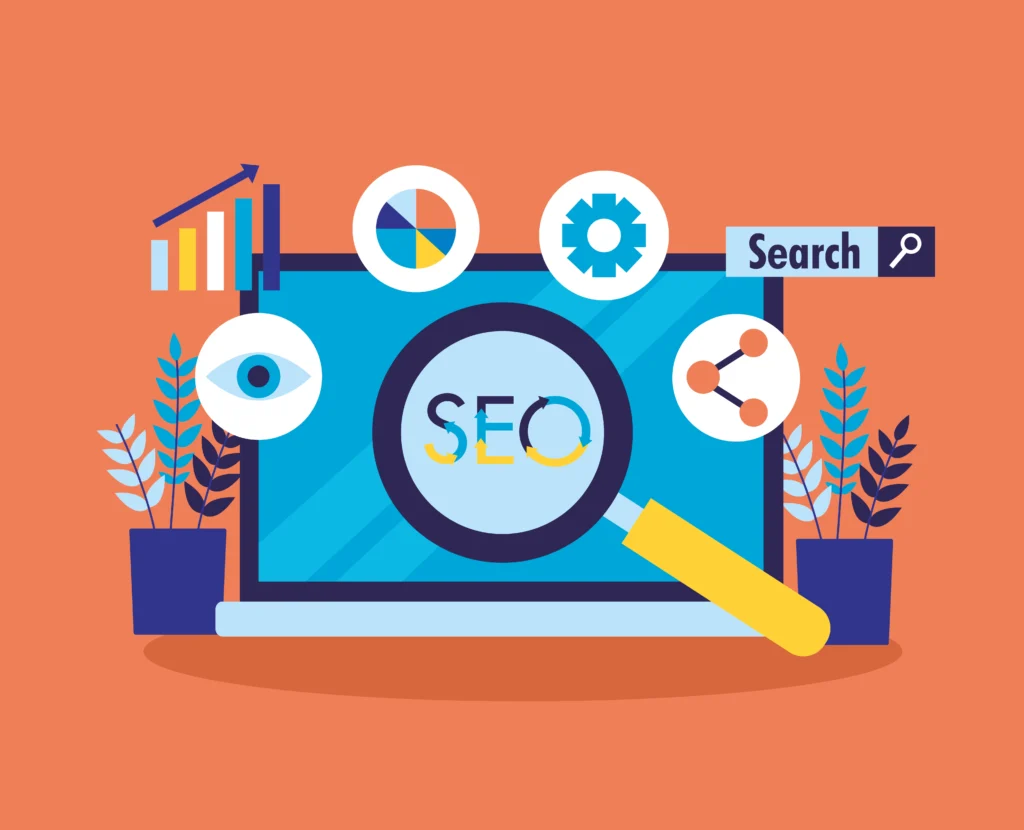SEO, or Search Engine Optimization, is like making your online stuff (like a website or blog) friendly to search engines, especially Google. Imagine the internet as a massive library, and SEO is your way of ensuring your book is not just in there but is easy to find.
In this blog post, we are going to explain SEO in simple terms.
What is SEO
As a writer who’s been in the industry for over a decade,
I’ve witnessed firsthand how much the world of SEO has changed and evolved during that time.
But even as algorithms and strategies come and go, the core goal remains the same – improving website visibility in search engines to attract more organic traffic.
What exactly is SEO in Digital Marketing?
SEO stands for search engine optimization. It’s the process of optimizing a website and its content to achieve higher rankings in search engines for relevant keywords and phrases.
The higher a site ranks for a term a user searches for, the more likely that site is to be clicked and visited. So SEO is all about earning that coveted top spot.
The goal is to make pages as search engine friendly as possible, signaling to algorithms about the topic and purpose of each page.
In simple terms, SEO is about speaking the language of search engines so they can introduce your content to people looking for it.
SEO: How It Works and Why It Matters
SEO is an ongoing process: Search engine algorithms are constantly changing, so it’s important to stay up-to-date on the latest trends and best practices. But before that, it’s also important to understand –
- What is a Search Engine?
- How Search Engine Works?
Search engines like Google have become an integral part of our lives. We turn to them countless times per day to find information, products, services, and more.
But few people truly understand how search engines actually work and why optimizing for them is so important for businesses.
Firstly understand the search engine and the working style of the search engine.

What Is a Search Engine?
A search engine is a web-based tool that enables users to find information on the internet by entering keywords or phrases.
Popular examples include Google, Bing, and Yahoo. When a user performs a search, the search engine scans its index of web pages and returns results that match the query.
Search engines are like really smart helpers on the internet. You know when you want to find something online, like the best pizza place or info about puppies?
You type it into Google or Bing, and they show you a list of websites that might have what you’re looking for. Those are the search engine’s results.

How Search Engines Work:
Search engines rely on programs called crawlers or spiders that continuously scan the web and collect information about webpages, including text content, images, videos, and more. All of this data gets stored in the search index.
The search algorithm then matches search queries to the most relevant pages in milliseconds.
Crawling:
Think of tiny robots called “crawlers” constantly scouring the web, following links from one page to another, discovering and indexing new content. Like librarians cataloging new books, these crawlers add the found pages to the search engine’s database.
Indexing:
Once a page is discovered, the crawlers analyze its content. They look for keywords, understand the page’s purpose, and extract additional information like images, videos, and links.
This is like the librarians reading book summaries and organizing them on shelves based on topic and relevance.
Ranking:
When you type a search query, the search engine uses complex algorithms to analyze the indexed pages and rank them based on their relevance to your query.
Think of the librarians expertly pulling out the most relevant books for your specific request.
Now after understanding the search engine process let’s cover how SEO works.
How SEO Works:
SEO is like giving the search engine a heads-up
– saying, “Hey, my website is awesome for this topic, check it out!”
It’s about making your website more attractive to the search engine so it shows up higher when people look for stuff.

Types of SEO
On-Page SEO
On-page SEO refers to optimization techniques applied directly to a webpage to improve rankings. This includes:
- Optimized Title Tags – Title tags appear in search results and should concisely describe the page content. They should contain relevant keywords.
- Meta Descriptions – Meta descriptions summarize page content and appear in search results snippets. They should be engaging and keyword-rich.
- Headings – Page headings organize content into logical sections. They emphasize keywords and phrases.
- Content – The body content should focus on the topic being targeted and feature keywords naturally.
- Image Alt Text – Alt text describes images for search engines and should include keywords where relevant.
- Internal Links – Internal links allow crawlers to discover other important pages on your site.
- URL Structure – URLs should be short, keyword-rich, and describe page content.
Off-Page SEO
Off-page SEO involves earning signals from other websites to boost rankings, including:
- Backlinks – Securing backlinks from authoritative sites helps improve domain authority and page rankings for specific keywords.
- Social Shares – Having content shared socially signals popularity and improves visibility.
- Local SEO – Optimizing online listings, reviews, and citations improves local search visibility.
- Press Mentions – Earning brand mentions, features, and interviews on reputable sites builds credibility.
Technical SEO
Technical SEO creates the proper website infrastructure for search engines, including:
- Site Speed – Faster sites rank better due to improved user experience. Core web vitals should be optimized.
- Mobile Friendliness – Websites need to accommodate mobile devices which account for most web traffic.
- Strong Site Architecture – Site architecture impacts crawling ability and indexation. A sitemap helps.
- Clean Code – Semantic HTML, properly formatted metadata, and no broken links.
- Security – HTTPS encryption provides site security.
In addition to these three main types of SEO, there are also several other types of SEO, such as:
- Local SEO: This is the practice of optimizing your website to rank higher in local search results. This is important for businesses that have a physical location, such as restaurants, stores, and service providers.
- E-commerce SEO: This is the practice of optimizing your website to rank higher in search results for products and services that you sell online.
- Image SEO: This is the practice of optimizing your website’s images to rank higher in image search results.
- Video SEO: This is the practice of optimizing your website’s videos to rank higher in video search results.

SEO Ranking Factors
SEO involves various factors that impact how well a website shows up in search results. Let’s break them down in simpler terms:
- Keywords: These are the words or phrases people type into search engines. Using the right ones in your content helps search engines understand what your site is about.
- Content Quality: It’s about creating really good and helpful content. Search engines want to recommend valuable stuff to users.
- Backlinks: When other websites link to yours, it’s like getting a virtual thumbs-up. It shows your content is trustworthy and worth checking out.
- User Experience: This is how easy and enjoyable it is for people to use your website. If it’s user-friendly, search engines are more likely to recommend it.
- On-Page Optimization: It means tweaking elements on your actual web pages so search engines understand your content better.
- Mobile Friendliness: How well your website works on phones and tablets. With more people using mobile devices, it’s an important factor.
- Site Speed: It’s about making sure your website loads quickly. Fast websites are preferred by users and search engines.
- Social Signals: This involves activity on social media related to your content. It can indicate that your content is popular and relevant.
- Technical SEO: It’s about optimizing the technical aspects of your website, like its structure and how it’s understood by search engines.
- Regular Updates: Adding new stuff or updating existing content shows that your website is active and current.
- Local SEO (for local businesses): It’s about making sure your business shows up in local searches, like when someone looks for a nearby restaurant.
- Site Security (HTTPS): Ensuring a secure connection for users. Search engines favor secure websites.
- Content-Length and Depth: Providing thorough content that fully addresses what users are looking for.
- Image Optimization: Make sure images load quickly and enhance the user experience.
- Structured Data (Schema Markup): Adding extra information in a structured way to help search engines better understand your content.
- Authority and trust – High-quality backlinks from authoritative sites help build domain authority and trust, which improves rankings.
- Competition – Ranking gets harder for more competitive keywords, requiring more authority.
- UI/UX – Simple, user-friendly web design and navigation boosts user engagement.
- Link quality and quantity – Natural backlinks from relevant, reputable sites are preferred over artificial or manipulative linking strategies.
Example Of SEO-
Let’s complete this guide with an easy example of SEO, in this we started with books and libraries. In this example let’s complete the library
Imagine SEO as a friendly guide helping people find the best books in a giant library called the internet.
The Library (Internet):
Think of the internet as a massive library with billions of books (websites). When you want to find something, you ask the librarian (search engine) for help.
The Librarian’s Job (Search Engine):
The librarian’s job is to show you the most relevant and helpful books based on what you’re looking for. This is where SEO comes in – it helps your book (website) catch the librarian’s attention.
Secret Words (Keywords):
Every book has secret words (keywords) that describe what it’s about. SEO helps you use these words so the librarian (search engine) can easily figure out what your book is about.
Good Book (Quality Content):
A well-written, interesting book (content) gets more readers. SEO encourages you to create high-quality content so that people enjoy reading your book, and the librarian knows it’s worth recommending.
Recommendations (Links):
Imagine other books recommending yours – that’s like having other websites link to your content. SEO values these recommendations because it show that your book is respected and valuable.
Easy to Find (Website Structure):
A well-organized library is easier to navigate. SEO helps you arrange your bookshelves (website structure) so readers (and the librarian) can find what they need without getting lost.
Beautiful Pictures (Media):
Books with helpful pictures (images and videos) are more appealing. SEO suggests using visuals to make your book more attractive to readers and the librarian.
New Books (Regular Updates):
Libraries regularly add new books to stay interesting. SEO encourages you to update your content regularly, signaling to the librarian that your book is fresh and relevant.
Happy Readers (User Experience):
If readers enjoy your book, they come back. SEO ensures your website is a pleasant place for readers, with easy navigation and quick loading times, making the librarian (search engine) more likely to recommend it.
In simple terms, SEO is like making your book (website) library-friendly so that the librarian (search engine) happily recommends it to people searching for similar topics.

Why SEO Is Important?
SEO, or Search Engine Optimization, is like the magic dust of the online world, making your website shine brighter and attracting more visitors just like Cinderella’s transformation. Here’s why it’s crucial:
Visibility and Traffic:
Imagine walking through a crowded marketplace with thousands of stalls. Without a sign on yours, people will likely keep walking. SEO is like putting up a bright, eye-catching sign that tells people what you offer and draws them in.
The higher your ranking in search results, the bigger and bolder your sign, grabbing attention and leading to more visitors (customers) on your website.
Leads and Sales:
Just having people stop by your stall isn’t enough. You need to convince them to buy something.
SEO not only brings people in but also helps attract the right audience, those actively searching for what you offer. It’s like having targeted advertising, bringing potential customers who are already interested in your products or services. This increases the chances of converting visitors into leads and ultimately sales.
Credibility and Reputation:
Remember how people tend to trust shops with long lines and good reviews?
SEO can help build that trust and reputation online. Ranking high in search results shows search engines and visitors that you’re a reliable and relevant source of information. This positive perception leads to increased brand awareness and a competitive edge.
Cost-Effectiveness:
Compared to traditional marketing like billboards or TV ads, SEO is a long-term investment that can pay off significantly. Once you optimize your website and build authority, the benefits keep flowing (like a well-oiled machine) without needing constant spending.
This makes it a cost-effective way to reach a wider audience and drive growth.
Future-Proofing your Business:
The online world is constantly evolving, and search engines are the gatekeepers of information.
By understanding and embracing SEO, you’re not just building a website, you’re building a strong online presence that adapts to these changes and stays relevant in the ever-shifting digital landscape.
In a nutshell, SEO is like the secret ingredient that makes your online ventures thrive. It gives you visibility, attracts the right audience, builds trust, and saves you resources along the way. So, sprinkle some SEO magic on your website and watch your online success blossom!
SEO- The Ever Evolving Process
As Google’s algorithms have grown more advanced, SEO has evolved to rely far less on spammy tactics and keyword stuffing. Today, creating compelling, useful content focused on human readers is the best path toward ranking success.
While keywords remain important for honing in on relevancy, content must be written first and foremost to satisfy users’ needs and demands.
So while the world of SEO will surely continue to change in the years ahead, high-quality content rooted in genuine human value is the strategy I plan to stick with.
As search engines get smarter, creating content of substance becomes imperative not just for rankings, but for long-term success.
However, with a solid SEO strategy in place, you can significantly improve your website’s visibility and attract more qualified leads.
Also read our- SEO GUIDE 2024: TYPES, STEP-BY-STEP PROCESS & BENEFITS
What is search engine optimization?
Search engine optimization (SEO) is the process of improving a website’s ranking in search engine results pages (SERPs) by increasing its visibility and relevance to searchers. This is done by optimizing on-page elements like titles, content, metadata and off-page elements like backlinks, social shares etc. to match with search intent.
What does SEO stand for?
SEO stands for Search Engine Optimization. It refers to strategies and techniques used to optimize a website to rank higher in search engines like Google, Bing, etc.
How to do SEO?
Some key ways to do SEO include:
- Conduct keyword research to identify relevant terms and topics to target
- Optimize page titles, headings, content for those keywords
- Improve website speed and mobile friendliness
- Build high-quality backlinks from other websites
- Create engaging content that users want to share
- Use alt text properly for images and videos
- Leverage tools like Google Search Console, Google Analytics, etc.
Why is SEO important?
SEO is important because higher rankings in search engines means:
- Increased visibility – More people can find your content/website
- Higher traffic – More visitors to your site from organic search
- Lower costs – Free organic traffic vs paid ads
- Better brand awareness & authority
- Higher conversions and sales for ecommerce sites
What is on-page SEO?
On-page SEO refers to optimizations made directly on a website page itself to improve SEO ranking factors. This includes tactics like:
- Optimizing page titles and meta descriptions
- Using target keywords appropriately in content
- Improving webpage loading speed
- Ensuring proper formatting of HTML code
- Optimizing images with alt text
- Structuring website into logical site architecture
What is SEO ranking?
SEO ranking refers to the position of a website in the search engine results pages (SERP) for a particular keyword or search query. A higher ranking means the website appears closer to the top of the SERP. The main goal of SEO is to improve a website’s rankings for relevant searches.
What are SEO keywords?
SEO keywords are the terms and phrases that people search for in search engines that relate to your business offerings. Identifying the right keywords to target through SEO allows you to rank for searches you want. Examples of SEO keywords could be:
- For a bakery – “cupcakes near me”, “custom cakes”
- For a gym – “fitness classes”, “gym memberships”
- For an accountant – “small business accounting”, “tax preparation services”
How important is SEO?
SEO is very important for businesses today because:
- Majority of web traffic comes from search engines
- Higher rankings drive more organic traffic and brand awareness
- SEO helps create more inbound leads and sales
- It provides better return on investment than paid search ads
- Crucial for being found when users search for products/services
- Important for competing with other brands targeting similar keywords
What does SEO stand for in business?
In a business context, SEO stands for search engine optimization. It encompasses strategies and techniques businesses use to improve their visibility and rankings in search engines for keywords potential customers are searching for. SEO is important for businesses that rely on web traffic and want to gain an advantage over competitors.
.
